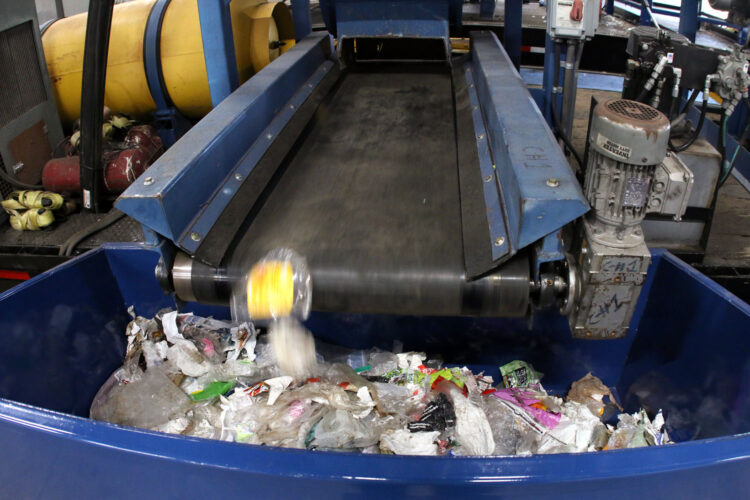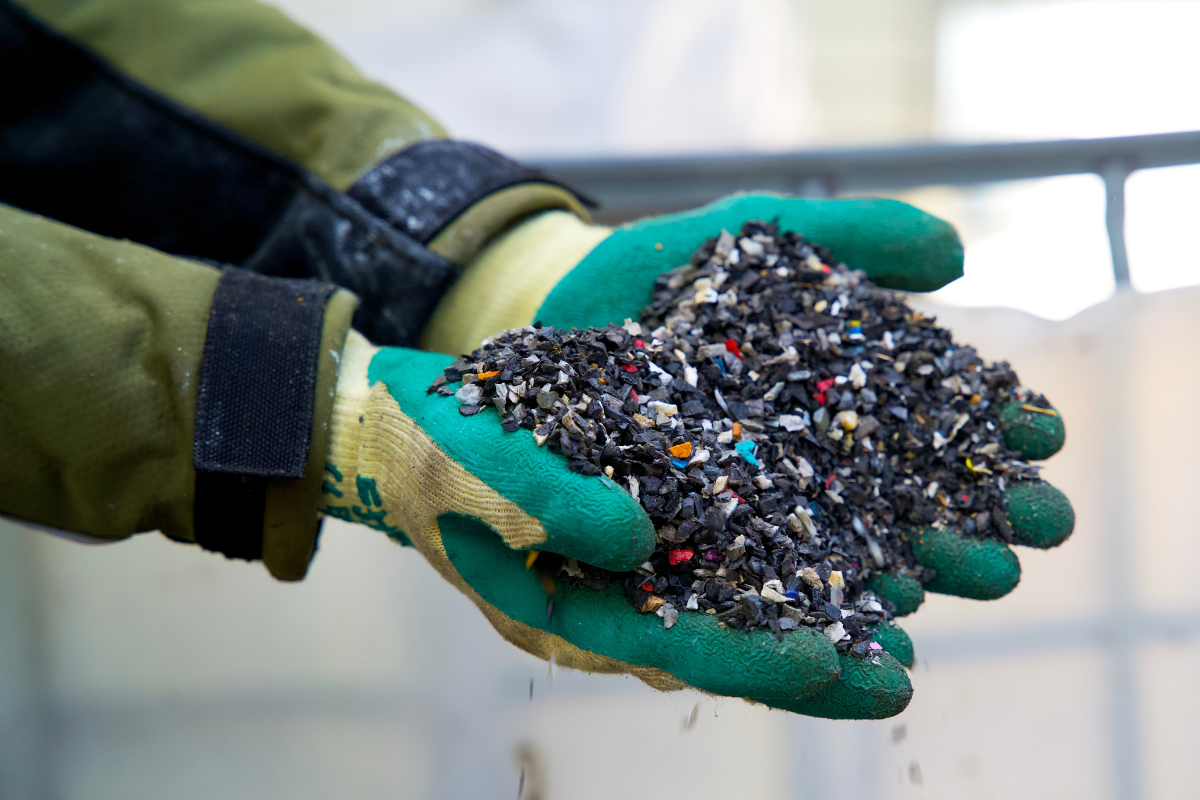A multi-stakeholder project was able to hit some goals separating flexible plastic packaging from other recyclables at a MRF. But backers also reported significant hurdles moving material downstream cost-effectively.
The Materials Recovery For the Future (MRFF) initiative last week published its findings after working with the J.P. Mascaro TotalRecycle materials recovery facility (MRF) in Birdsboro, Pa. for over a year.
MRFF is a project of the American Chemistry Council (ACC) and also includes a variety of virgin plastic producers, consumer goods companies, industry associations and other stakeholders. (The Association of Plastic Recyclers, which owns Resource Recycling, Inc., is a member of the MRFF project.)
Consulting firm Resource Recycling Systems (RRS) carried out research for the MRFF project.
MRFF set out with five performance goals and ultimately met four of them during the pilot phase.
The project was able to repeatedly reduce paper content to less than 15% of a designated flexible packaging bale (called an rFlex bale). The sortation effort also managed to reduce the amount of flexible packaging ending up in paper bales, reduced the quality control staffing needs on the fiber line, and integrated the flexible packaging recovery system into the MRF’s existing control system.
The project fell short of hitting a fifth goal, capturing at least 90% of the flexible packaging coming into the MRF. As of February 2020, the TotalRecycle MRF was hitting a 74% capture rate. The MRFF report noted additional equipment tuning and minor upgrades were in progress.
However, the project assessment also noted many of the larger hurdles for successful flexible packaging recovery are tied to complications around reprocessing and end markets.
“At the time of publication, the cost of collecting and processing [flexible plastic packaging] outweighs its value as a commodity that can be sold back to industry,” the report noted.
Unless end users source recycled flexible plastic packaging and consumers buy products that include recycled content, “the markets for the material put out at the curb or into store drop-off receptacles will remain anemic,” according to the report.
Implications for the MRF
The MRFF project provided the TotalRecycle facility with significant equipment upgrades at no cost to the MRF. The project estimated these upgrades would cost other recycling programs between $2.25 and $2.41 per ton of recyclables processed. That figure varies based on local landfill tip fees and bale revenues.
TotalRecycle plans to continue and expand its ability to sort out flexible packaging. According to the report, the MRF decided to make additional equipment improvements this year.
During the second quarter of 2020, TotalRecycle planned to add a quality control station on the flexible packaging bale stream, allowing for manual removal of large paper and other contaminants, the report stated. The facility also planned to install an air hood over a quality control optical sorter, conveying picked flexible packaging to the rFlex stream. And the MRF planned to relocate a drum feeder to be in line with the presort, in an effort to reduce clumping and increase material spread.
“All of the above actions are expected to improve the [flexible plastic packaging] recovery rate,” the report stated.
Beyond testing the viability of curbside film recovery, the project provided the TotalRecycle MRF with several benefits from installing the flexible packaging sortation equipment, including cleaning up more traditional commodities it produces. The facility saw a 70% contamination reduction in its mixed paper and old newsprint bales, according to the report.
The MRFF project will publish results of the recent equipment upgrades on its website.
Reprocessing landscape
The MRFF project found only a few North American reprocessors interested in taking in the rFlex bales, mainly because the bales contained both plastic and paper.
In its early stages, the project worked with Continuus Materials, which shredded the bales and used both the paper and plastic components to make roof sheathing. It also partnered with Zzyzx, a company that tested a “shear pulverization” technology on the bales and produced a “very fine and extremely well mixed material” that was suitable for injection molding, according to MRFF.
Still, the report noted, “while all tests were successful, the supply chains to take an rFlex bale and get it washed, ground and processed for a plastics-only market did not exist in the U.S.”
As the project moved forward, it deepened its work with Continuus. It also conducted tests with PAVERRECO, Erema, QRS-RePoly and Ultra-Poly, as well as with several firms using pyrolysis and gasification technologies.
Those tests helped demonstrate that flexible packaging bales need to be cleaned up further for plastics-only markets, and reducing fiber and rigid PET in the bales would be particularly important. Project backers also learned that bales with at least 70% polyolefin yield would be useful for many end markets. And they determined that a dry washing step between the MRF and reprocessor would be beneficial.
Demand is key
The building-products sector is a promising field for end market investment, according to the project team. For one thing, this market doesn’t require the level of reprocessing that other uses do; the plastics do not need to be processed into pellet or flake form.
Additionally, there is established and growing demand for building products both from the public and private sectors the report stated.
As an example of the type of funding support that’s needed, the report pointed to an investment by Waste Management in Continuus Materials.
Barring recycled-content mandates, the team concluded that building demand for recycled flexible packaging bales will require investment and long-term customer contracts, if the recycling system is to expand and be viable.
“The customer is the catalyst in manufacturing economies,” the report stated.
The MRFF report suggested that product manufacturers and retailers that use flexible film packaging begin to incorporate building materials containing recovered flexible materials in their facilities.
The demand growth will drive other flexible packaging recovery improvements, according to the report, as MRFs will have an incentive to produce and optimize such flexible packaging bales.
Creating bale specifications
Assuming curbside flexible packaging recovery advances, bale specifications will need to be developed, according to the project team.
“RRS expects flexible plastic bales may follow a similar pattern to the development of paper bales, so there will be different grade specifications driven by the requirements of different end market production processes,” the report stated.
Whether those specifications can be achieved during initial sorting at the MRF or whether the bales will need to undergo additional post-MRF sorting “remains to be seen,” the report added.
The project team offered two potential bale specifications, an “rFlex mixed bale grade” that includes 15% paper and 85% low-value flexible plastics, and a second higher-grade “FPP plastic bale grade” that’s rich in polyolefin plastics and has a negligible amount of paper and other contaminants.
A version of this story appeared in Plastics Recycling Update on June 17.

























